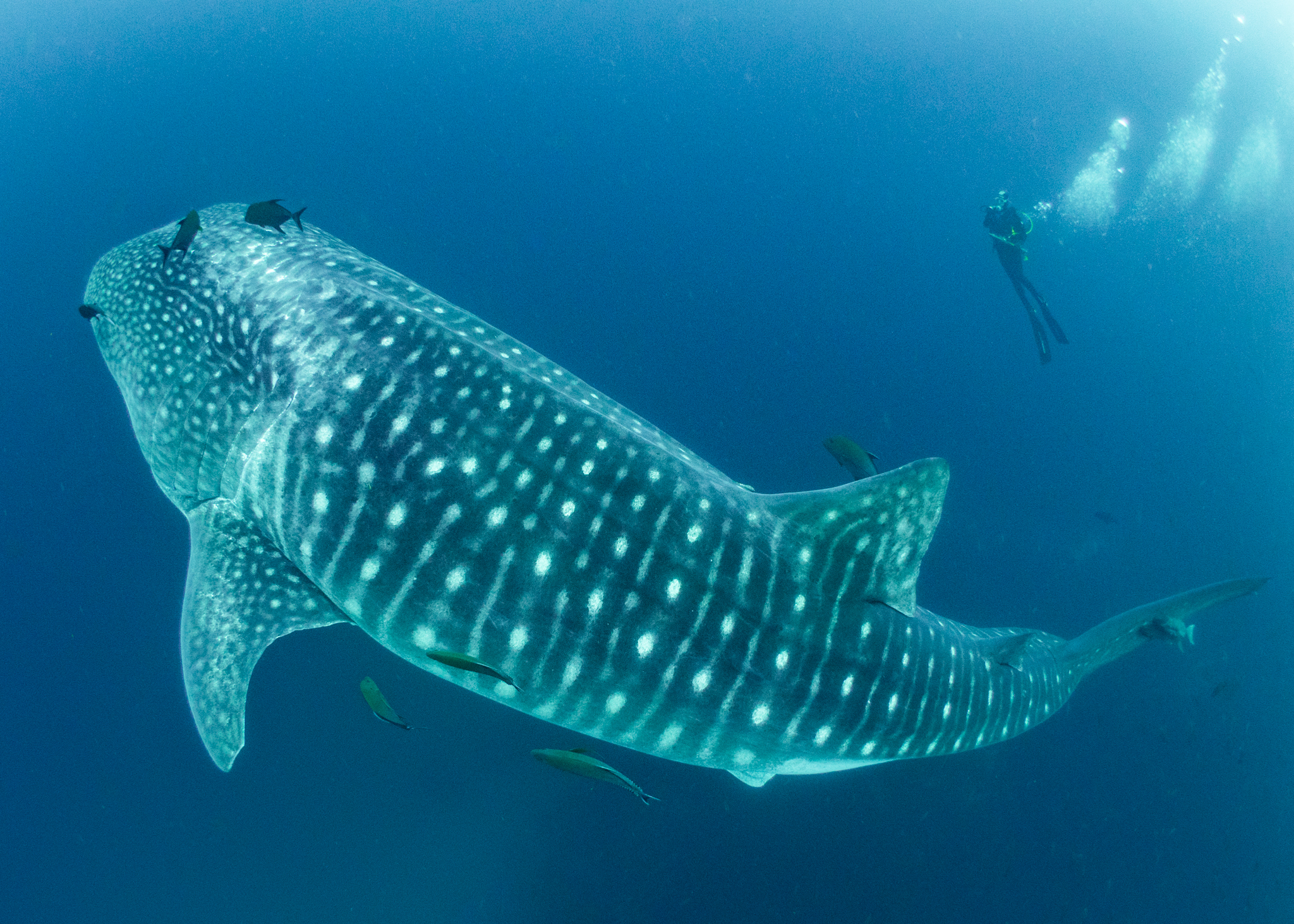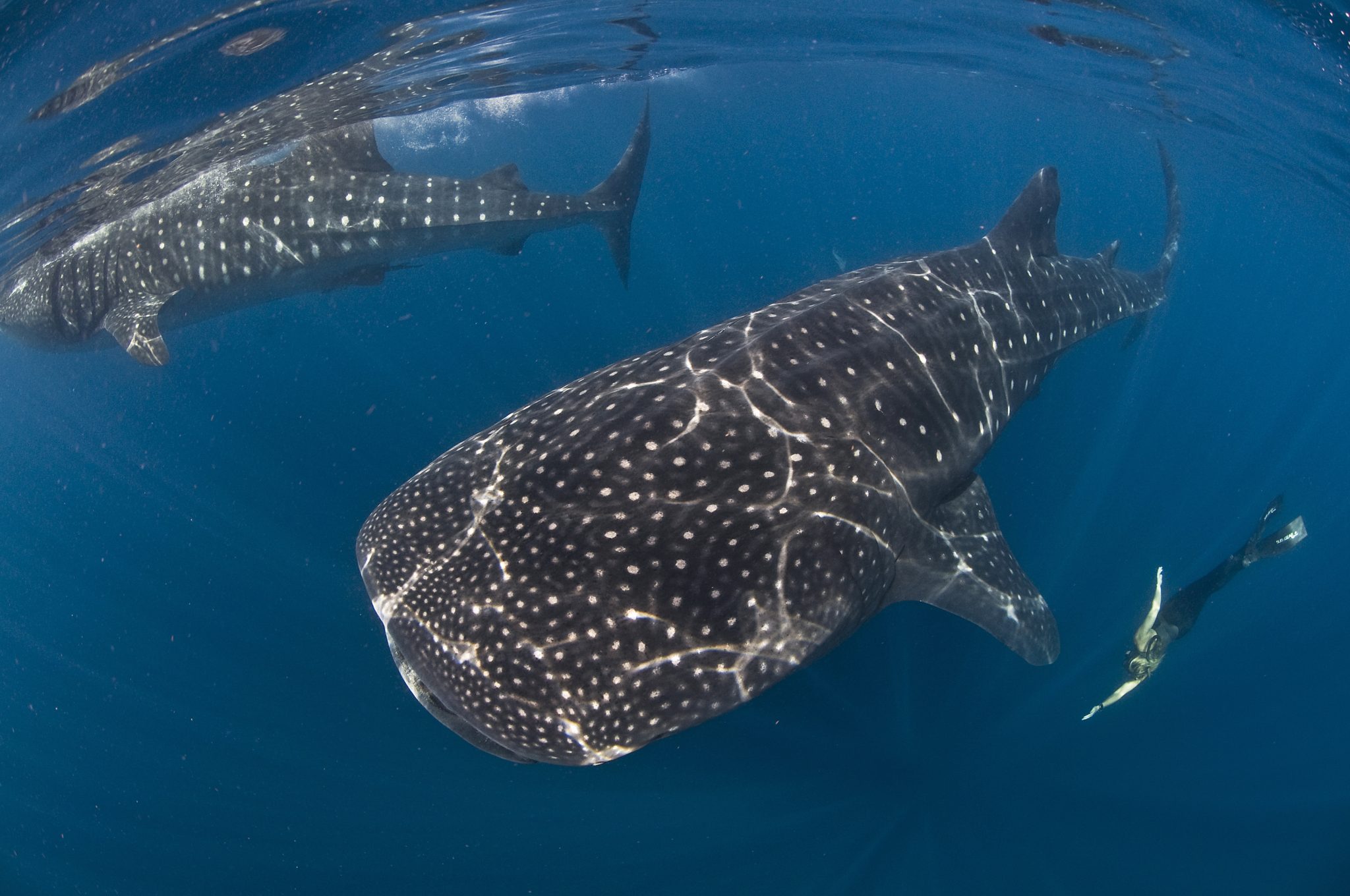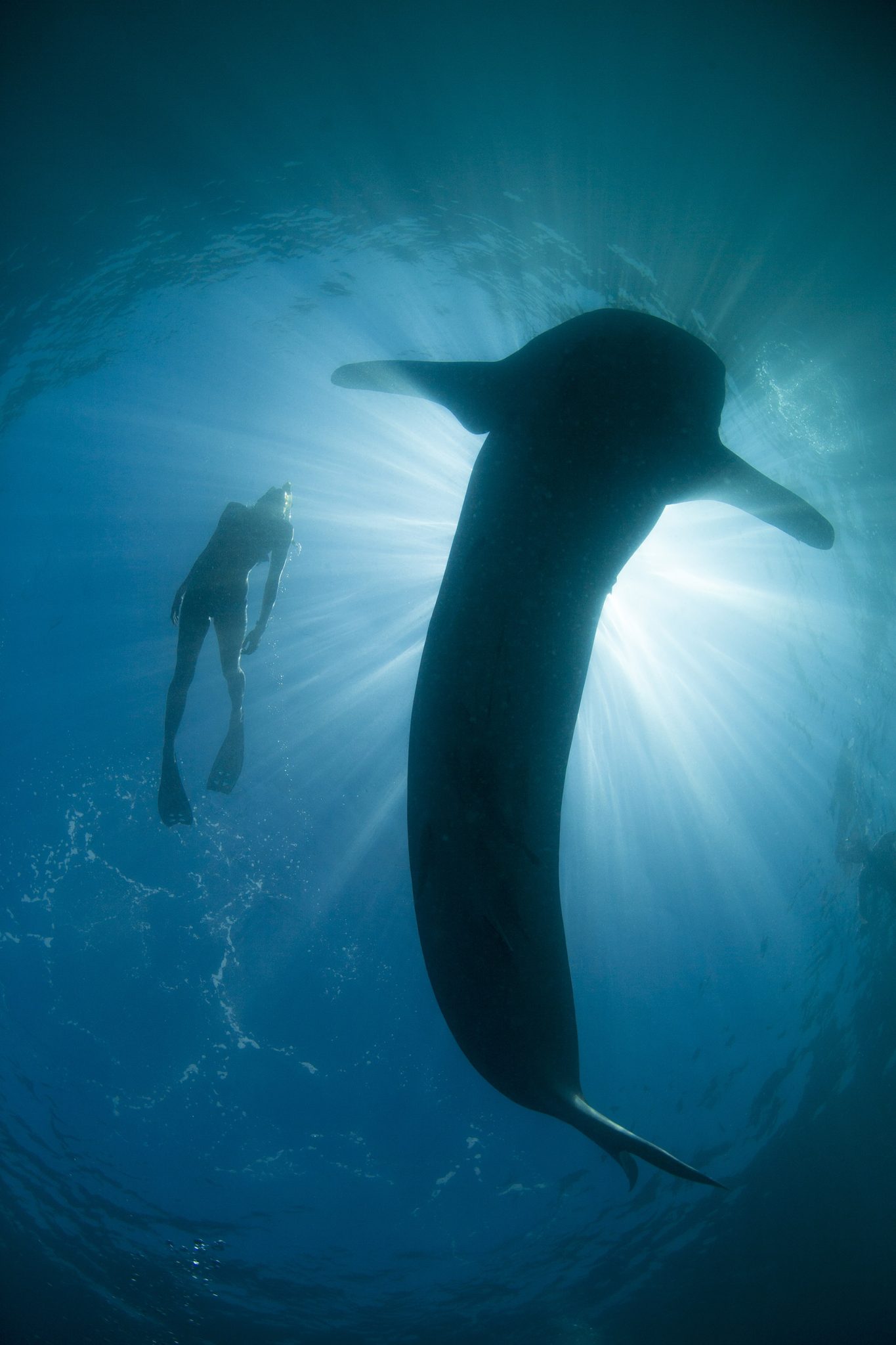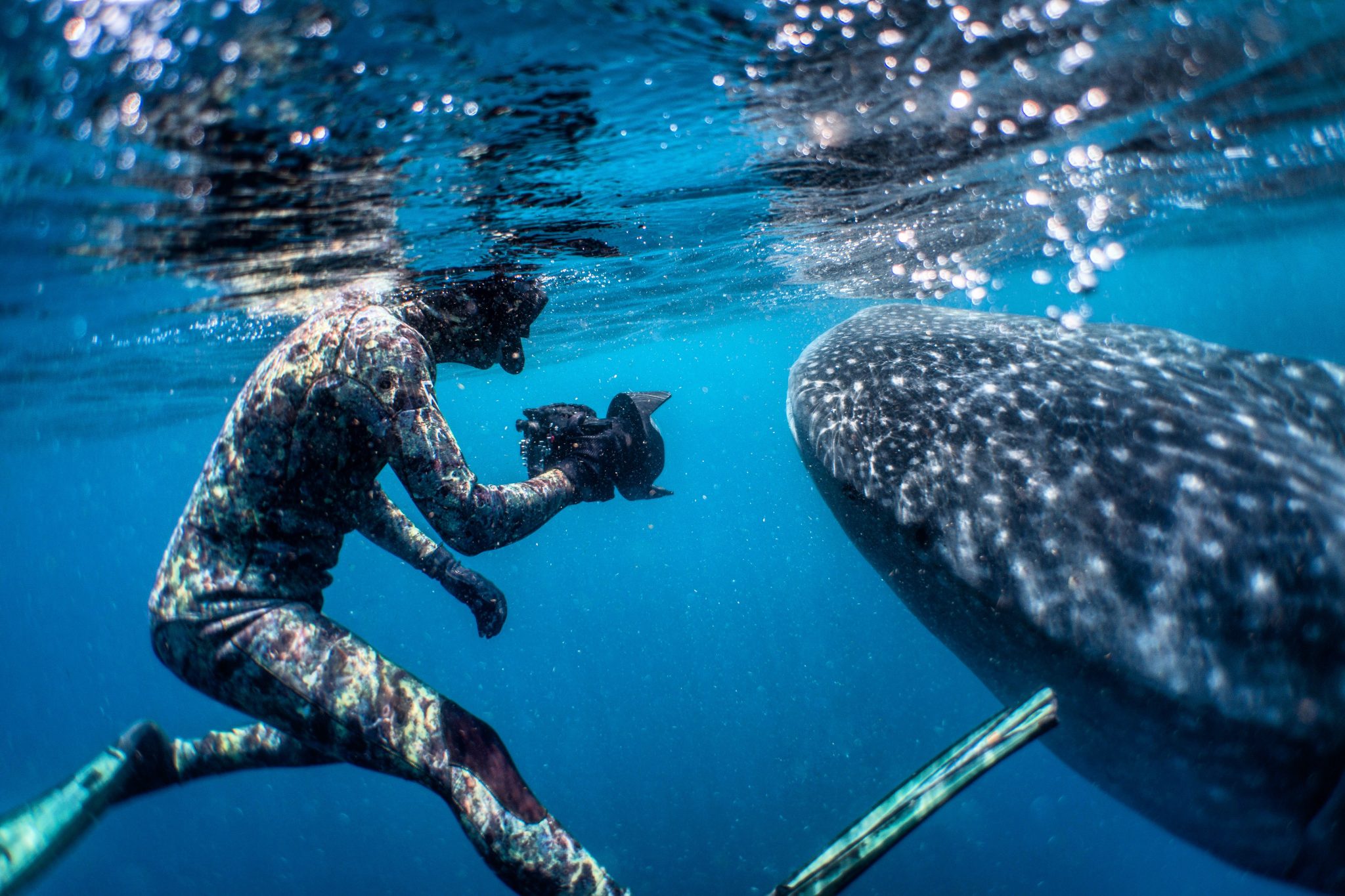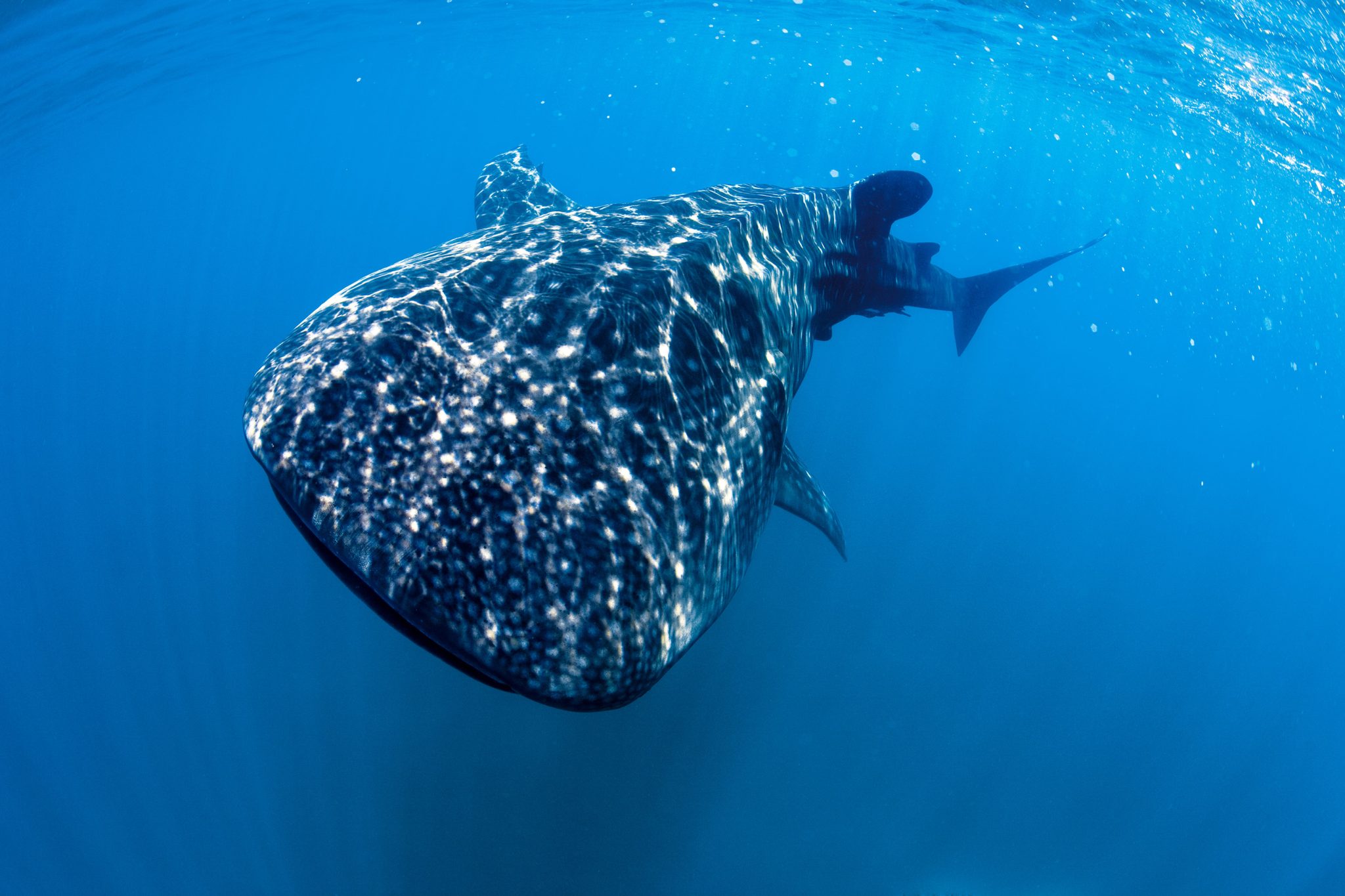Marine Life & Conservation
Celebrating the biggest fish in the sea: International Whale Shark Day 2022
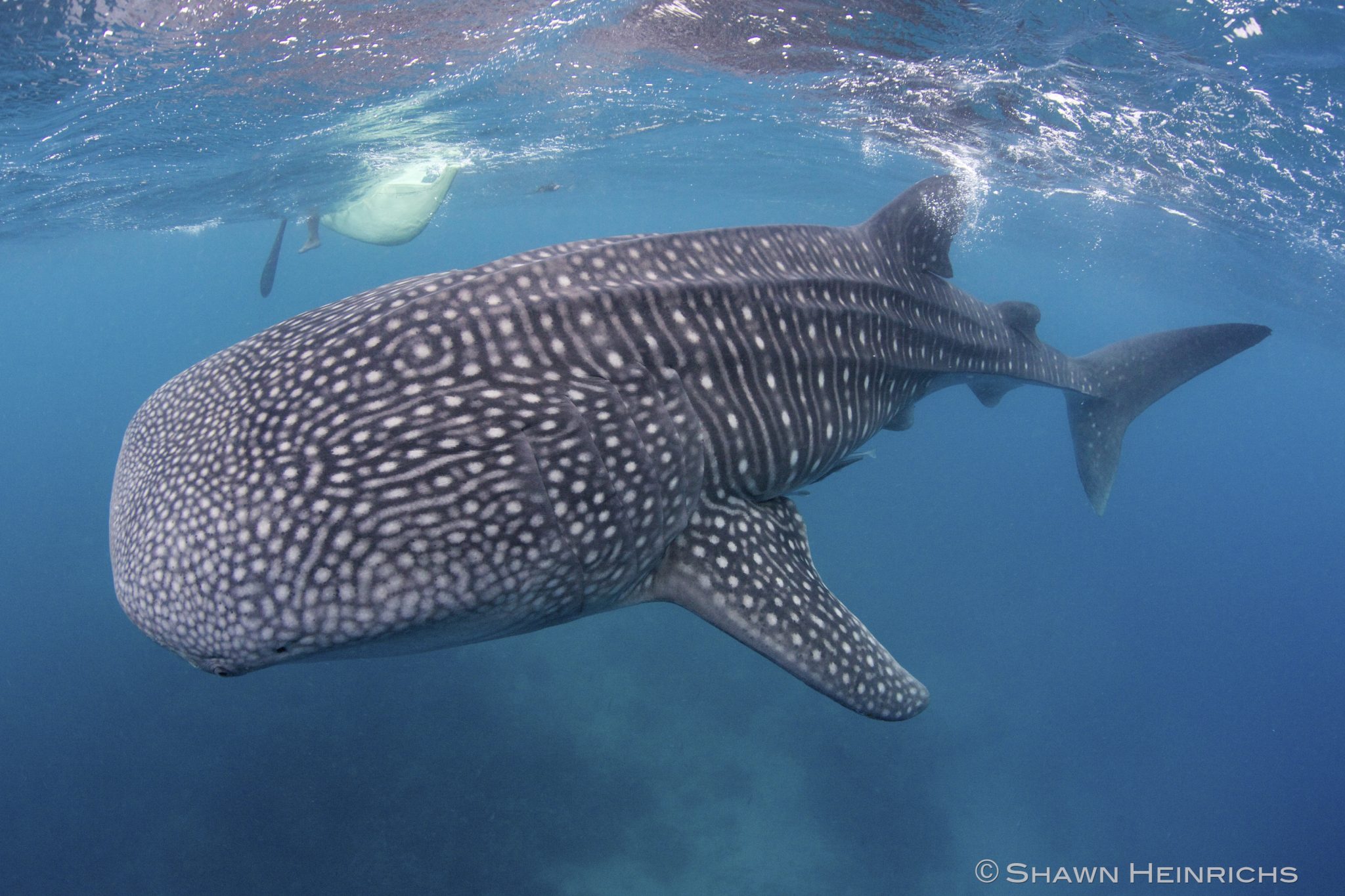
On August 30, the world is showing the biggest shark that lives in our oceans some big, BIG love. Because believe it or not, the biggest fish in the sea needs all the love they can get! Sure they are a shark – but they are the closest thing to a vegetarian that exists in the shark world. Filter feeders, they eat plankton. While their mouths are 4 feet wide, their throats are the size of a quarter. And before you begin to worry about their 3000+ teeth, you should probably know they are only the size of the head of a match.
It’s hard to believe given the fact they can grow up to 40 feet in length and weigh up to 20 tons, but they are very elusive and proficient in the art of underwater camouflage. In fact, Jacques Cousteau only saw three in his lifetime!
They are found in all temperate and tropical oceans around the world except for the Mediterranean Sea, and can migrate thousands of miles between feeding areas. They spend most of their lives near the surface, but have been known to dive to depths of almost 2,000m.
These gentle giants are magical – with a unique dot pattern that is specific to each individual whale shark. Their populations are so low that there is a genetic similarity among all whale sharks worldwide. Whale sharks play an extremely important role keeping the oceans healthy while also creating sustainable income for local communities through tourism. However, like many other shark species, whale sharks are classified as Endangered on the IUCN Red List of Endangered Species, with declining populations worldwide. With massive migratory areas that make them difficult to protect, the fact they are often bycatch or targeted for their meat + fins, and as filter feeders that they often consume micro-plastics, whale sharks need all the help they can get.
Here’s everything you need to know about these incredible fish – including how to meet them, how to protect them, and how to celebrate them every day!
Whale Shark Fun Facts:
- Name: Rhincodon typus
- Size: 18- 40 feet
- Weight: up to 20 tons (equivalent to 3 African Elephants, a full school bus or 12,000+ bricks!)
- Physical features: mouths are 5 feet wide with 3,000 teeth, eyes are as big as golf balls
- Life Span: estimated 60-100 years
- IUCN Red List Status: Endangered
1) Love Tropical Waters Both Deep and Shallow
The preferred environments of whale sharks are tropical and temperate waters and all over the world, including both deep and shallow coastal waters and lagoons of coral atolls.
A marine biologist named Eric Hoffmayer recorded the deepest dive yet: in 2008, he monitored a shark in the Gulf of Mexico that descended 6,324 feet. Sharks lack a swim bladder that keeps other fish buoyant, so one idea is that whale sharks free-fall toward the seafloor to rest.
Whale sharks especially love the Philippines. In 2016, the 1000th whale shark was identified in Philippine waters, making the Philippines the third largest known aggregation of whale sharks in the world and the biggest in South East Asia.
2) Endurance Swimmers Who Are Global Travelers
Whale sharks are one of the most migratory species and can travel around 40 miles per day! They tend to prefer different geographic locations at various times of year based largely on water temperature, food supplies and breeding opportunities. Genetic studies show that whale sharks across the globe are closely related which suggests that mating is one of the reasons for such long travels.
It is believed that pregnant females will migrate long distances to be able to give birth near remote islands where baby sharks will be out of reach of common predators.
But they are also slow swimmers (for sharks) usually moving at no more than 3 mph. Their swimming pattern is different than most sharks in that instead of using just the caudal fin for primary propulsion, they use the full posterior two-thirds of their body length.
The record for whale shark migration was 12,000 miles by a whale shark named Anne in 2011. She was tracked making the mammoth migration from near Panama in the southeastern Pacific, to an area close to the Philippines in the Indo-Pacific. Other tracked whale sharks have traveled:
- Over 8,000 miles from the Gulf of CA, Mexico to Tonga
- 3,107 miles to the coast of Thailand
3) They Enjoy Alone Time
Whale sharks are usually solitary creatures but come together for months in large aggregations to feed in plankton-dense waters. After feeding, they drift off in random directions, completely disappearing during winter and spring.
4) They Practice Vegetarianism
Whale sharks can eat plankton up to 45 pounds of plankton each day (which is equivalent to 121 cheeseburgers per day). But they also eat shrimp, sardines, anchovies, mackerels, squid, tuna, and albacore. and fish eggs. According to The Nature Conservatory, whale sharks will wait as long as 14 hours for fish to spawn on reefs and then they will swoop in and eat the eggs.
But they also largely have a vegetarian diet, especially when other prey is scarce. Scientists discovered that whale sharks get more than half their nutrients from plants and algae.
5) Each Baby Whale Shark is a Miracle!
Whale sharks are ovoviviparous, meaning they produce eggs that hatch inside the mother’s uterus. Litters can be up to 300 pups but not all pups are birthed at the same time. That is almost twice as many as any other shark species.
But only one pregnant whale shark has ever been studied and, interestingly, many of these embryos were at different stages of development. Scientists observed that some were still in their egg cases whilst others had emerged but were still in the uterus. This may signify that females are able to store a male’s sperm, selectively fertilizing their eggs over a prolonged period.
Juvenile whale sharks, as docile and vulnerable as their elders, often become prey for other sharks and orcas, so while a female may birth more than 300 pups at a time, survival rates are devastatingly low; females giving birth to multiple litters at different times could increase their survival rate which could be why they have their very own, built-in sperm banks.
Making the birth of a whale shark even more miraculous is the fact that each whale shark’s pattern is as unique as a human fingerprint!
Think You Know Whale Sharks? Click here for a fun way to test your whale shark IQ!
Header Photo: Whale shark in Oslob by Shawn Heinrichs
Blogs
Invitation from The Ocean Cleanup for San Francisco port call

6 years ago, The Ocean Cleanup set sail for the Great Pacific Garbage Patch with one goal: to develop the technology to be able to relegate the patch to the history books. On 6 September 2024, The Ocean Cleanup fleet returns to San Francisco bringing with it System 03 to announce the next phase of the cleanup of the Great Pacific Garbage Patch and to offer you a chance to view our cleanup system up-close and personal.
We look forward to seeing you there.
To confirm your presence, please RSVP to press@theoceancleanup.com
PROGRAM
Join The Ocean Cleanup as our two iconic ships and the extraction System 03 return to San Francisco, 6 years and over 100 extractions after we set sail, to create and validate the technology needed to rid the oceans of plastic.
Our founder and CEO, Boyan Slat, will announce the next steps for the cleanup of the Great Pacific Garbage Patch. Giving you a chance to view our cleanup system and the plastic extracted.
Hear important news on what’s next in the mission of The Ocean Cleanup as it seeks to make its mission of ridding the world’s oceans of plastic an achievable and realistic goal.
Interviews and vessel tours are available on request.
PRACTICALITIES
Date: September 6, 2024
Press conference: 12 pm (noon)
Location: The Exploratorium (Google Maps)
Pier 15 (Embarcadero at Green Street), San Francisco, CA
Parking: Visit The Exploratorium’s website for details.
RSVP: press@theoceancleanup.com
Video & photo material from several viewing spots around the bay
We look forward to seeing you there!
ABOUT THE OCEAN CLEANUP
The Ocean Cleanup is an international non-profit that develops and scales technologies to rid the world’s oceans of plastic. They aim to achieve this goal through a dual strategy: intercepting in rivers to stop the flow and cleaning up what has already accumulated in the ocean. For the latter, The Ocean Cleanup develops and deploys large-scale systems to efficiently concentrate the plastic for periodic removal. This plastic is tracked and traced to certify claims of origin when recycling it into new products. To curb the tide via rivers, The Ocean Cleanup has developed Interceptor™ Solutions to halt and extract riverine plastic before it reaches the ocean. As of June 2024, the non-profit has collected over 12 million kilograms (26.4 million pounds) of plastic from aquatic ecosystems around the world. Founded in 2013 by Boyan Slat, The Ocean Cleanup now employs a broadly multi-disciplined team of approximately 140. The foundation is headquartered in Rotterdam, the Netherlands, and opened its first regional office in Kuala Lumpur, Malaysia, in 2023.
Find out more about The Ocean Cleanup at www.theoceancleanup.com.
Marine Life & Conservation
SHARK MONTH ARRIVES AT ROYAL WILLIAM YARD, PLYMOUTH

A shark has been spotted approaching Royal William Yard in Plymouth, much to the surprise of swimmers, paddleboarders and onlookers.
With its distinctive dorsal fin cutting through the water, the sizeable shark swam along the coastline, before turning to head inland towards Firestone Arch at Royal William Yard. The appearance drew a crowd, who were captivated for more than an hour by the unusual sight – and it was all caught on video.
The shark is one of many expected sightings at Royal William Yard over the coming weeks… because today marks the start of Shark Month!
In reality, the ‘shark’ spotted along the Plymouth shoreline was actually a custom-made model, created by the team at Royal William Yard and sailed underwater by Caroline Robertson‑Brown from the Shark Trust, who donned scuba diving gear for the occasion.
The stunt took place to launch Shark Month in style and draw attention to the work of the leading international conservation charity, which is based in Britain’s Ocean City. Spectators were reassured that the water was safe and many entered into the spirit of the performance, swimming or sailing alongside the shark.
Shark Month will take place across Royal William Yard throughout July and will feature an extravaganza of art, entertainment and advocacy for everyone to enjoy. The packed programme of events starts with an art exhibition and ends with a trip on paddleboards with shark experts – with everything from a shark quiz to a Jaws screening in between.
Paul Cox, CEO of the Shark Trust, said: “There are often assumptions and misconceptions when it comes to sharks. This was certainly the case with the shark spotted at Royal William Yard! While the British coastline is home to many species of shark, this was not one of them. However, we’re thrilled it caught people’s attention, because seeing a shark is a special and memorable moment. That is precisely why we want to celebrate these incredible creatures, highlight the need for conservation, and ask for help to safeguard their future.”
For more information about Shark Month at Royal William Yard, visit the Shark Trust Website.
Images and video: Jay Stone
-

 Blogs2 months ago
Blogs2 months agoDiving With… Nico, Ocean Earth Travels, Indonesia
-

 News1 month ago
News1 month agoMurex Bangka Announce New Oceanfront Cottages & Beachfront Dining
-

 Blogs2 months ago
Blogs2 months agoA new idea in freediving from RAID
-

 Marine Life & Conservation1 month ago
Marine Life & Conservation1 month agoIceland issue millionaire whale hunter a licence to murder 128 vulnerable fin whales
-

 Marine Life & Conservation2 months ago
Marine Life & Conservation2 months agoThe Shark Trust Great Shark Snapshot is back
-

 News3 months ago
News3 months agoCharting New Waters; NovoScuba Goes Global with the Launch of their Revolutionary Dive Training Agency!
-

 Gear News1 month ago
Gear News1 month agoNew Suunto Ocean – a dive computer and GPS sports watch in one for adventures below and above the surface
-

 Marine Life & Conservation Blogs2 months ago
Marine Life & Conservation Blogs2 months agoBook Review: Plankton


